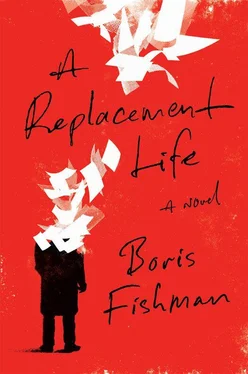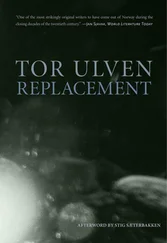Peter was bent above a turtle-faced pensioner. “Look at that kikele ,” the older man was shouting, pointing his sailing cap at Settledecker. “Ai-ai-ai. You have to admire how far a Jew can go in this country.”
Peter looked at Slava and smiled dumbly, pointing his pen at Turtle-Face. The Devickis, nobles of Poland, had partaken of Russian boar and timber but hadn’t bothered with the language. Peter was straining for the dim corners of long-unvisited brain rooms where a grandmother or grandfather once used words that shared more than they didn’t with Russian. From where in Poland had Peter’s ancestors come? Slava would have to ask him. Minsk had been the western edge of the Soviet Union until 1939, the villages west of it Polish territory. If it wasn’t for transliteration and history, he and Peter could have been countrymen. Peter could have been Slava’s Slav twin.
Slava was about to start across to help when one of Settledecker’s assistants appeared before them. She knelt in front of the old man, her black top hot just to look at. Settledecker seemed to surround himself only with women. Peter said something to the girl, then looked back at Slava, thumbs up.
At last everything was ready — the seniors seated, the assistants lined up behind Settledecker, the cameramen staring into their viewfinders. Settledecker scratched at his beard and approached the microphone, his modest potbelly jiggling. Cautiously, he tapped the head, as if it were the first microphone of his life.
“Ladies and gentlemen,” he said. He swiveled to face the rows of folding chairs. “Survivors,” he nodded. He returned his gaze to the cameras and looked ahead without speaking. All at once there was too much silence. Settledecker coughed. Then he turned back to the folding chairs. The pensioners were motionless. Settledecker rolled his eyes and, half turning, hissed to someone behind him. One of the assistants ran down the steps of the dais and whispered into the ear of the woman in the corner chair of the first row. Oi-oi-oi. The woman slapped her forehead and pulled at the nylon jacket of the woman next to her. “ Poshli , Roza, my idyom !” Let’s go, Roza, we’re moving.
The first row followed with discipline. Then the second, waiting patiently until the first had filed out. Settledecker nodded from the stage. The lead woman, the assistant’s hand gently steering her back, began to mount the platform. Roza and the rest followed. Ghosts, they were going to file past Settledecker as he spoke.
“Ladies and gen—” Settledecker started again, but a tugboat blared from the Hudson. He opened his hands to the sky. “We will begin, of course, only when God wills it.” Light laughter from the grass. “Ladies and gentlemen,” he said. He half turned again: “Survivors.” He pointed at the cameras. “And I do call them survivors. Because they are. I am going to pose a question to you. Any of you. You, sir.” He selected a cameraman. “Imagine your country — our country — is invaded. Imagine our conquerors — and make no mistake, we’ve been conquered — our conquerors have no special feeling for Americans, but it’s New Yorkers they really dislike. Oh, they really hate them. Difficult to imagine, isn’t it?” Another round of laughter. “The rest of America is more or less autonomous, but New Yorkers they herd into concentration camps.” Settledecker lifted his hand and began to count on his fingers. “Starvation. Disease. Extermination. Gas chambers. You see what I’m getting at. Sir, where are you from?”
The cameraman whom Settledecker was pointing to uncoupled his face from his viewfinder. “The Bronx,” he shouted up to the stage.
“The Bronx!” Settledecker repeated. The prisoners filed behind him, professional grief in their faces, their bodies tired and slumped. They didn’t know what was being said. Someone had told them that doing this might get them money. In their heads, calculations were being made about what those euros could buy. A new car for the son-in-law. And a limousine medallion. Enough to help the children get a down payment together, because everyone else’s children already owned a home. They would crawl across the dais if that’s what it took.
“The Bronx is an internment camp, my friend,” Settledecker went on. “Your family — you got a family, sir?”
“Two kids,” the cameraman shouted. There was a bored practice to his tone.
“Two kids,” Settledecker said. “And a wife who brought them into the world, I presume?” He paused again for mild laughter. “Well, they are in Camp Bronx. But — last question, sir, I promise — your name?”
“Joseph Rumana,” the cameraman said. “Junior. You want to know what we’re having for dinner?”
The other cameramen laughed. Settledecker smiled tolerantly into the microphone. “ Thank you , sir.”
The cameraman cocked a finger at Settledecker and pulled the trigger. He was a plant.
“The Rumanas are rounded up. But Mr. Rumana — loving husband and father — finds a way for his family to slip out, leaving him alone in the camp. His wife and children spend the next four years wandering the country, living off scraps, fending off attack, suffering the worst kind of humiliation — because by now there are people in Utah and Texas who say, ‘Let them have New York. Then they’ll leave us alone.’ The war is so long, Mr. Rumana’s boys become old enough to join the U.S. Army. In trenches they fight. Mrs. Rumana works twenty-hour shifts in a factory, making munitions.
“It’s like this for years, ladies and gentlemen,” Settledecker went on. “ Years . When it’s over, there used to be eight million in New York. Now there are two. Imagine this city with two million people. I know, I know — room to walk. But I’m serious. Miraculously, Mr. Rumana has survived. He weighs a third of what he used to, he’s sick with things medicine has yet to describe, he’s seen things that none of us can imagine. But he’s alive. For decades, Mr. Rumana must agitate against the German government to have a value put on his suffering. Can it be measured in numbers? That’s not for us to answer.” Settledecker pointed an index finger at the sky. He was warmed up now, swaying.
“But something that we do have to ponder: German restitution covers only Mr. Rumana. That’s right — everything that his wife and his boys went through, all because New York was invaded by Germans, and they won’t see a cent. Sixty years later! Mrs. Rumana is eighty-seven years old! These are her last days on earth. She has gout, arthritis, glaucoma. From day after day working in the dark, casting artillery shells. But no! The generous German government doesn’t cover anyone who wasn’t — I quote to you from the official documents—‘incarcerated in concentration camps, ghettos, or forced labor battalions.’ Shame, ladies and gentlemen!” Settledecker was thundering, his cheeks quivering. “Shame!” he bellowed, and for a moment it was easy to imagine that there was no act in his speech. He blinked several times, his words echoing. The survivors had finished filing past him. They milled on the other side of the dais, unsure what to do.
“But why resort to fiction?” Settledecker said quietly, now in the transport of tormented appeal. “Why don’t we hear the facts from the survivors themselves? And then you decide for yourselves. You won’t hear from me again. Decide for yourselves. Decide if you want to petition your congressman, your senator. The choice is in your hands. No one else can help these people, only your word. But who will speak up when they come for me? Yes, please.”
Settledecker, eyes afire, turned to the pack of seniors and gestured to the woman who had been in the first seat in the corner row. The woman was a cake, concentric tiers of flab from her face to her waistline. But her nails were tidy semicircles, and thick amber earrings hung from her ears. She lolled her head weakly.
Читать дальше











